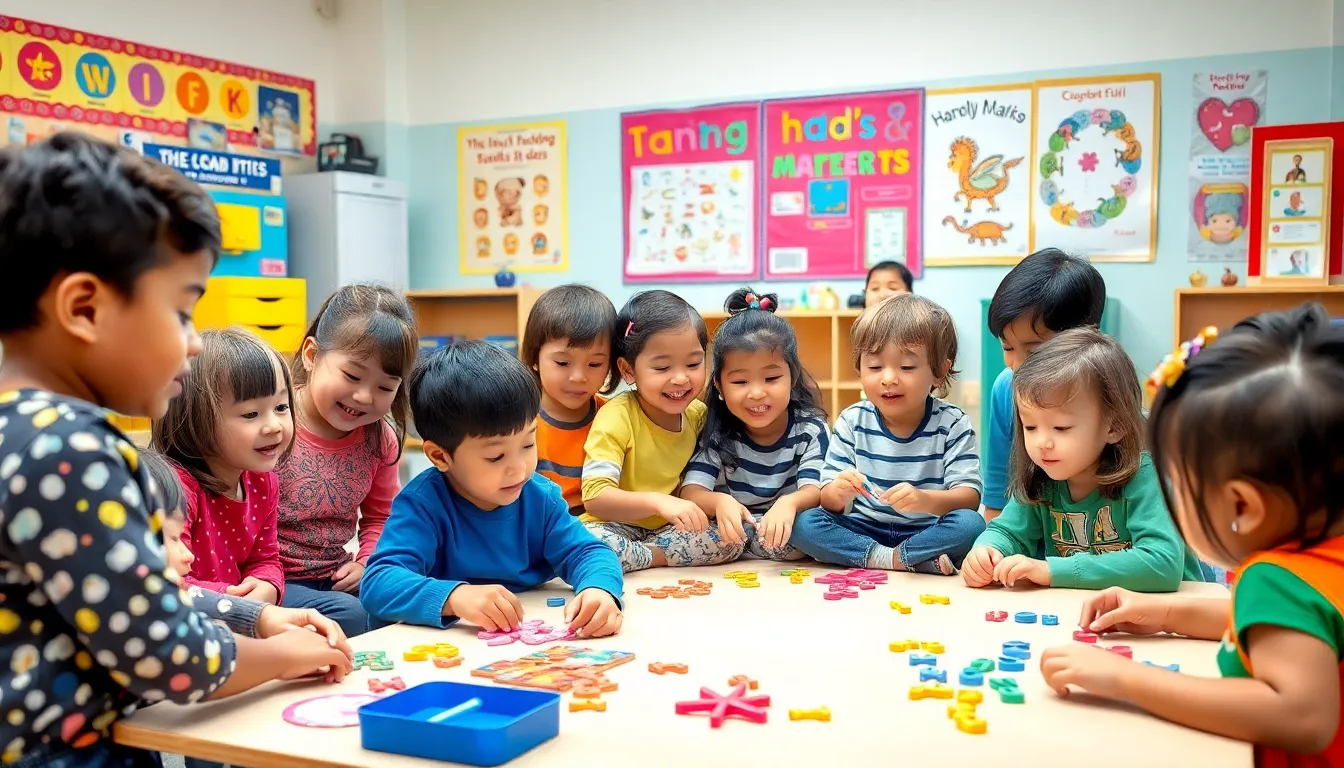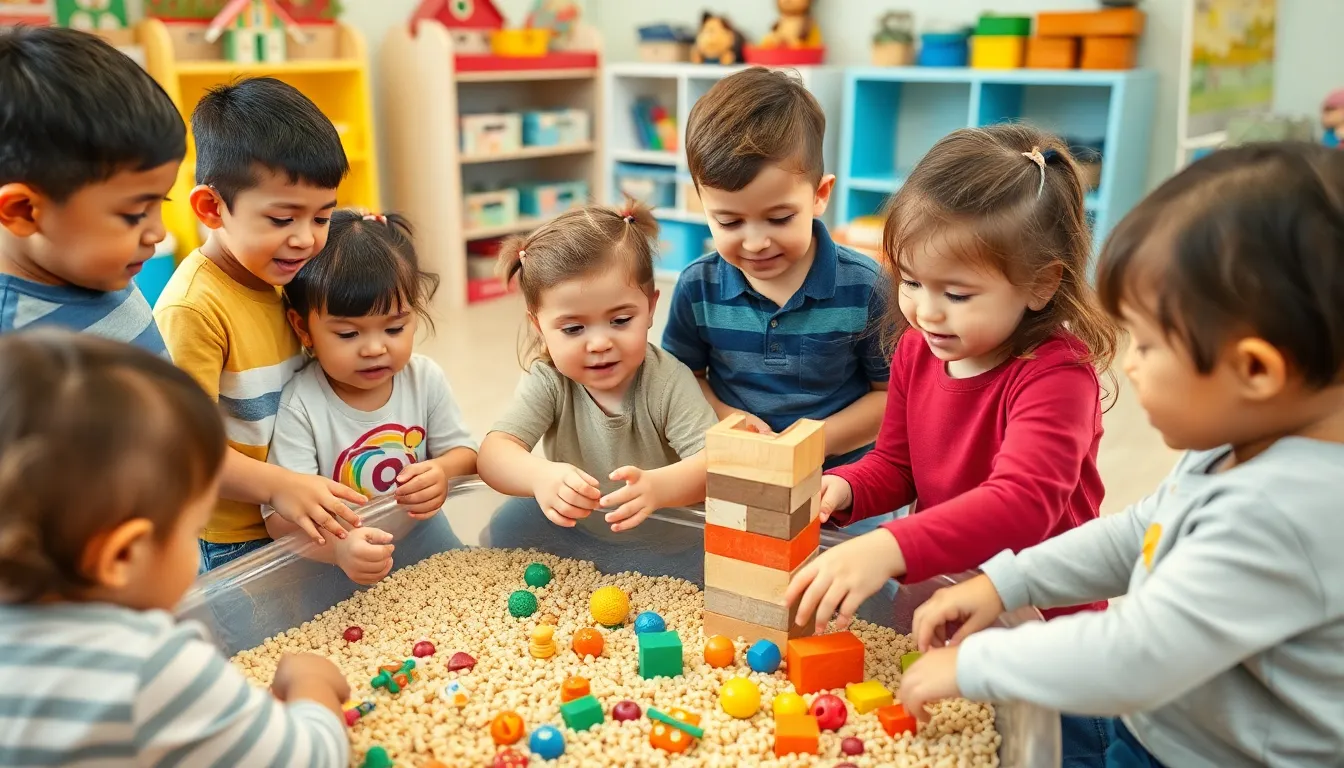In the world of preschool, learning isn’t just about crayons and nap time—it’s an exciting adventure waiting to unfold! Imagine a place where tiny hands create masterpieces and curious minds explore the wonders of numbers and letters. Preschool learning activities are the secret sauce that turns playtime into learning time, and they’re more fun than a barrel of monkeys!
From sensory bins that spark creativity to storytime that ignites imaginations, these activities lay the foundation for lifelong learning. Parents and educators alike know that engaging preschoolers in dynamic and interactive ways can make all the difference. So buckle up as we dive into a treasure trove of playful activities that not only entertain but also educate. After all, who said learning can’t be a hoot?
Table of Contents
ToggleImportance Of Preschool Learning Activities
Preschool learning activities play a crucial role in early childhood development. Engaging children through various activities promotes cognitive growth and enhances social skills. Research indicates that children exposed to interactive learning experiences demonstrate improved problem-solving abilities.
Hands-on activities, such as sensory play and arts and crafts, stimulate curiosity and creativity. These experiences encourage exploration and critical thinking. Collaborative tasks foster teamwork, allowing children to learn from one another while building friendships.
Language development also benefits from preschool activities. Storytime and interactive reading sessions expand vocabulary and enhance comprehension skills. Regular exposure to language-rich environments contributes significantly to literacy milestones.
Emotional and physical development occurs alongside academic growth. Activities that include movement such as dancing or outdoor play help develop motor skills and coordination. Positive experiences in preschool shape self-esteem and confidence.
Parents and educators find that structured learning activities provide children with a sense of routine. Consistency in daily activities strengthens focus and discipline. Moreover, diverse activities cater to different learning styles, ensuring every child finds their niche.
Beyond basic skills, preschool learning activities cultivate a love for learning. Children who enjoy their educational experiences are more likely to pursue knowledge later in life. Ultimately, investing in learning activities during preschool years lays a strong foundation for future academic success.
Types Of Preschool Learning Activities

Preschool learning activities encompass a variety of approaches tailored to support children’s development. Below are key categories of learning activities.
Cognitive Development Activities
Cognitive development activities stimulate critical thinking and problem-solving. Puzzles engage children’s minds while enhancing spatial awareness. Interactive games, like memory cards, improve concentration and recall skills. Storytelling fosters imagination and comprehension, promoting language skills. Activities that encourage counting or sorting develop numeracy knowledge and logical reasoning. These cognitive exercises nurture curiosity and encourage children to explore concepts through hands-on experiences.
Physical Development Activities
Physical development activities focus on building motor skills and coordination. Outdoor play encourages running and jumping, promoting gross motor skills. Arts and crafts, involving cutting and glueing, enhance fine motor skills while encouraging creativity. Obstacle courses improve balance and agility, offering a fun way to stay active. Dance and movement activities, with rhythm and coordination, further develop body awareness. These physical activities contribute to healthy growth while instilling the importance of an active lifestyle.
Social And Emotional Learning Activities
Social and emotional learning activities cultivate interpersonal skills and emotional intelligence. Group games encourage cooperation and teamwork, helping children learn to share and negotiate. Role-play scenarios allow children to express feelings and understand different perspectives. Storytime discussions promote empathy and self-awareness by exploring emotions in narratives. Circle time fosters a sense of belonging, enhancing social interaction and communication skills. Engaging in these activities supports a well-rounded emotional and social development.
Effective Preschool Learning Activity Strategies
Effective preschool learning strategies include engaging children through various approaches. Prioritizing play-based methods leads to deeper understanding and retention of concepts.
Incorporating Play-Based Learning
Incorporating play-based learning fosters natural curiosity and creativity. Activities like building blocks and pretend play offer opportunities for hands-on exploration. Through imaginative scenarios, preschoolers develop problem-solving skills and social interactions. Additionally, structured play sessions promote teamwork, allowing children to share thoughts and ideas. Research shows that such approaches improve cognitive and motor skills while keeping learning enjoyable. By integrating educational games, preschoolers increase their engagement levels and develop a lifelong love for learning.
Engaging Parents In Learning Activities
Engaging parents in learning activities strengthens home-school relationships. Facilitating workshops and sharing resources encourages participation in children’s education. Regular communication about ongoing projects keeps parents informed and invested. Collaborative activities, like family reading nights, enhance language skills and create a supportive learning environment. Encouragement of parental involvement leads to positive learning experiences and boosts children’s confidence. By involving caregivers, teachers create a community that values education, ensuring that learning extends beyond the classroom.
Challenges In Implementing Preschool Learning Activities
Implementing preschool learning activities presents several challenges that educators often face. Limited resources can hinder the effectiveness of various activities, forcing teachers to get creative with what they have. Space constraints also play a role, as smaller classrooms may restrict movement and interaction. Another obstacle involves navigating diverse learning styles, leaving educators to find methods that cater to every child’s unique needs.
Teacher training remains crucial when addressing these challenges. Insufficient training can lead to a lack of confidence in using new activities. Ensuring staff members have the necessary skills enhances their ability to implement engaging and educational experiences. They must balance structured learning with flexibility to adapt activities on the fly.
Parental involvement is another significant factor influencing the success of preschool learning activities. Engaging parents can prove difficult, as some may not fully understand the importance of participation in their child’s education. Maintaining consistent communication with families fosters a supportive environment, benefitting both home and school settings.
Time constraints often pressure educators to prioritize certain activities over others. Schedules packed with various responsibilities can limit the time available for crucial learning opportunities. Understanding the value of a well-rounded approach helps teachers navigate these time-related challenges.
Finally, safety concerns cannot be overlooked when planning preschool activities. Ensuring materials are age-appropriate and safe for young learners requires careful consideration. Educators must strive to create stimulating yet secure environments that encourage exploration while keeping children safe. Addressing these challenges strikes a balance between fostering educational growth and maintaining a nurturing atmosphere for preschoolers.
Preschool learning activities play a vital role in shaping young minds. They not only stimulate cognitive growth but also enhance social and emotional skills essential for a child’s development. By integrating play-based methods and engaging strategies, educators can create an enriching environment that fosters curiosity and creativity.
Involving parents in the learning process further strengthens the educational experience. This collaborative approach ensures that children receive support both at home and in school, promoting a love for learning that lasts a lifetime.
Overcoming challenges in implementing these activities is crucial for educators. With the right resources and training, they can provide a nurturing atmosphere that encourages exploration and discovery, setting the stage for future academic success.




